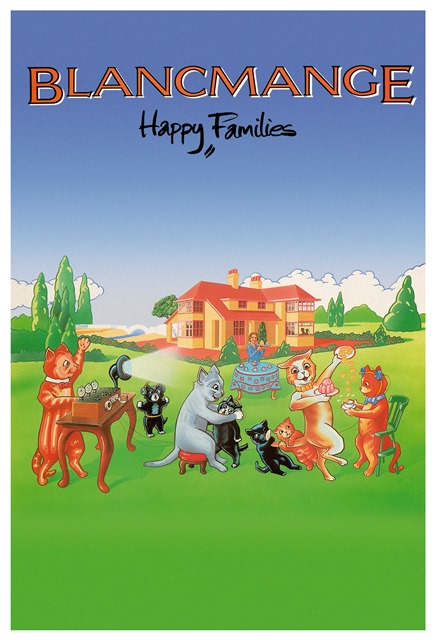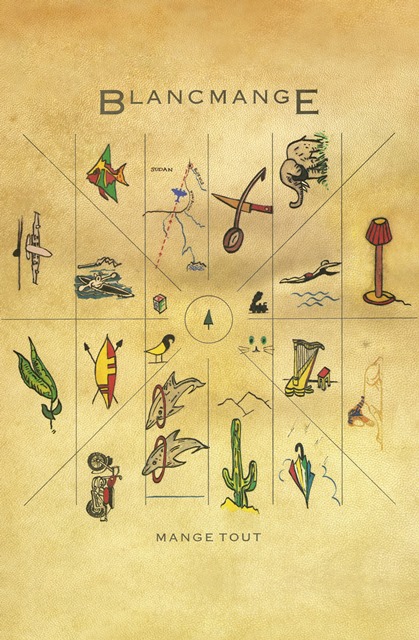Reissue CDs Weekly: Blancmange | reviews, news & interviews
Reissue CDs Weekly: Blancmange
Reissue CDs Weekly: Blancmange
Repackaged trio of Eighties albums reveals synth-popper’s art-rock roots

The Some Bizzare Album was released in January 1981. Compiled by DJ Stevo, it featured twelve unsigned acts he felt represented a fresh way of approaching pop – one enabled by the availability of synthesisers and rhythm machines. Stevo was playing the new music at the nights he hosted, putting the bands on and compiling the electronic chart for the weekly music paper Sounds.
From today’s perspective, the Some Bizzare Album plays out as a prescient snapshot of what would enter the mainstream. The Fast Set, Jell and The Loved One didn't have much of a future, but Depeche Mode, Soft Cell and The The became names to reckon with. So did Blancmange, whose demo of “Waves” opened side two. After signing with London Records – the home of Bananarama – their subsequent hit singles included “Living on the Ceiling”, “Blind Vision”, “Don’t tell me” and the Erasure-prefiguring ABBA cover "The Day Before You Came".
 Neil Arthur and Stephen Luscombe’s partnership as Blancmange came to halt in 1986 when, as the latter explains in the liner notes to new reissues of their three London-era albums, they were playing a charity concert at The Royal Albert Hall. “At the show,” he recalls. “I remember looking around during the concert and thinking to myself, ‘what the bloody hell am I doing here?’ What started as an experimental duo had become a full-on (no)show band. Also, it felt like Stephen and I were growing apart due to us working together for so long! Time to stop this for 26 years or so and protect our friendship.” They reunited in 2011 and issue their fifth post-reunification album, Unfurnished Rooms, in September.
Neil Arthur and Stephen Luscombe’s partnership as Blancmange came to halt in 1986 when, as the latter explains in the liner notes to new reissues of their three London-era albums, they were playing a charity concert at The Royal Albert Hall. “At the show,” he recalls. “I remember looking around during the concert and thinking to myself, ‘what the bloody hell am I doing here?’ What started as an experimental duo had become a full-on (no)show band. Also, it felt like Stephen and I were growing apart due to us working together for so long! Time to stop this for 26 years or so and protect our friendship.” They reunited in 2011 and issue their fifth post-reunification album, Unfurnished Rooms, in September.
The keyword there was “experimental”, and the reissue of Happy Families (originally released in September 1982), Mange Tout (May 1984) and Believe You Me (October 1985) brings home what an odd proposition they were, and how they uneasily balanced magpie-minded experimentation with the mainstream demands of the day. Nothing exemplifies this more than the fidgety, sitar and tabla-infused single “Living on the Ceiling”.
The surface level response is to view Blancmange as a synth-pop-duo UK analogue to Talking Heads: making music shot-through with nervous rhythms and manic declamatory singing, and writing songs open to influences from Africa and Asia. But that’s part of the story. Also bubbling through are elements of Future Days-period Can – especially on Mange Tout – and a more-than evident fondness for Robert Fripp. When a guitar is brought into the fold, it’s the treated, sky-saw texture developed by Fripp.
 It can be no coincidence that David Rhodes, their stage and studio guitarist, was similarly tuned into the pre-punk, art-rock wavelength. He also played with Peter Gabriel. Eight or so years earlier, and with more elongated songs, Blancmange would have been idiosyncratic British prog-rockers akin to King Crimson or Van der Graaf Generator, and signed to either Charisma or Island Records.
It can be no coincidence that David Rhodes, their stage and studio guitarist, was similarly tuned into the pre-punk, art-rock wavelength. He also played with Peter Gabriel. Eight or so years earlier, and with more elongated songs, Blancmange would have been idiosyncratic British prog-rockers akin to King Crimson or Van der Graaf Generator, and signed to either Charisma or Island Records.
It is bizarre they broke into the charts in an era when bright and shiny pop ruled the roost. But the duo kept their songs linear, precise and short. Nonetheless, around 30 years on from when these albums were originally issued, Blancmange are revealed as out-of-time fellow travellers with Britain’s pre-punk art-rockers rather than their contemporary post-punk synth-poppers.
Of the three albums, Believe You Me is the least convincing. It was recorded at seven separate studios and produced by Stewart Levine, an American music business veteran who had worked with grunty rockers The Marshall Tucker Band, jazz-rockers Dixie Dregs and BB King. He was behind the boards for the Joe Cocker and Jennifer Warnes schlock-fest “Up Where we Belong”. Arthur says they had told their label they wanted Brian Eno or Can’s Irmin Schmidt to produce the album. Blancmange did not get their way.
These reissues tell the story of a band which could not, no matter their willing, side-line an innate artiness in favour of a purely commercial approach and consequently survive. Their demise was inevitable. The picture is copiously filled out by each album being packaged as a three-disc set: the album plus bonuses on disc one; more bonuses from singles, 12-inches and demos on disc two; sessions and live recordings for the BBC on disc three. The casebound packages include an illustrated booklet with a too-short reminiscence from Neil Arthur. While it would have been good to read more from Arthur, fans will want these.
- Next week: Ireland's punk rock pioneers The Radiators From Space
- Read more reissue reviews on theartsdesk
Buy
Explore topics
Share this article
The future of Arts Journalism
You can stop theartsdesk.com closing!
We urgently need financing to survive. Our fundraising drive has thus far raised £33,000 but we need to reach £100,000 or we will be forced to close. Please contribute here: https://gofund.me/c3f6033d
And if you can forward this information to anyone who might assist, we’d be grateful.

Subscribe to theartsdesk.com
Thank you for continuing to read our work on theartsdesk.com. For unlimited access to every article in its entirety, including our archive of more than 15,000 pieces, we're asking for £5 per month or £40 per year. We feel it's a very good deal, and hope you do too.
To take a subscription now simply click here.
And if you're looking for that extra gift for a friend or family member, why not treat them to a theartsdesk.com gift subscription?
more New music
 Album: Jethro Tull - Curious Ruminant
Tull burst out again with a set of bristling folk-prog anthems
Album: Jethro Tull - Curious Ruminant
Tull burst out again with a set of bristling folk-prog anthems
 Music Reissues Weekly: Kraftwerk - Autobahn at 50
A reminder of changing perspectives
Music Reissues Weekly: Kraftwerk - Autobahn at 50
A reminder of changing perspectives
 Album: Architects - The Sky, The Earth & All Between
The Brighton metallers condense their 20-year career into an impactful concoction
Album: Architects - The Sky, The Earth & All Between
The Brighton metallers condense their 20-year career into an impactful concoction
 Jopy/Lemonsuckr/King of May, Green Door Store, Brighton review - exhilarating showcase for new young guitar bands
Local label Goo Records put on an ebullient show on their home turf
Jopy/Lemonsuckr/King of May, Green Door Store, Brighton review - exhilarating showcase for new young guitar bands
Local label Goo Records put on an ebullient show on their home turf
 Album: Abel Selaocoe - Hymns of Bantu
A celebration of the ancestors, African and European
Album: Abel Selaocoe - Hymns of Bantu
A celebration of the ancestors, African and European
 Album: Doves - Constellations for the Lonely
Prog-rock existential wranglings from the grizzled Mancunians
Album: Doves - Constellations for the Lonely
Prog-rock existential wranglings from the grizzled Mancunians
 Album: bdrmm - Microtonic
Post-shoegazing quartet’s third album evokes the communal musical experience
Album: bdrmm - Microtonic
Post-shoegazing quartet’s third album evokes the communal musical experience
 Rats on Rafts, The Victoria review - crepuscular Dutch quintet begins to see the light
Unexpected sprightliness gets feet moving
Rats on Rafts, The Victoria review - crepuscular Dutch quintet begins to see the light
Unexpected sprightliness gets feet moving
 Bilk, O2 Academy 2, Birmingham review - Essex rock'n'rollers blast into the weekend
Sol Abrahams’ crew whip up a storm
Bilk, O2 Academy 2, Birmingham review - Essex rock'n'rollers blast into the weekend
Sol Abrahams’ crew whip up a storm
 Album: Artemis - Arboresque
A safe album from a band with a necessary message
Album: Artemis - Arboresque
A safe album from a band with a necessary message
 Hinds, St Lukes and the Winged Ox, Glasgow review - Spanish garage rockers surviving and thriving
After a difficult few years, the group sounded resurgent, delivering a frantic show.
Hinds, St Lukes and the Winged Ox, Glasgow review - Spanish garage rockers surviving and thriving
After a difficult few years, the group sounded resurgent, delivering a frantic show.

Add comment